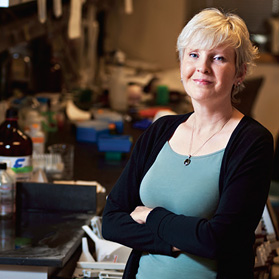Building on basics: Younger cancer patients face higher hurdles for healing

For Colleen Sweeney, co-director of the Breast Cancer Research Program at UC Davis Cancer Center, the stress-cancer link lingers on her radar. In 1998, two years into her career as a breast cancer researcher, the biochemist and molecular biologist witnessed how the drug Herceptin revolutionized the treatment for a virulent variant of the disease, affecting about one in four patients. This subtype is caused by multiple copies of the HER2 gene, which make excessive HER2 protein facilitating breast cancer’s growth and spread. Herceptin, widely considered as one of the first forms of personalized medicine, works by binding to the HER2 protein and intercepting the signal that prompts cancer cells to divide.
"The prognosis for the HER2-positive breast cancer patient is considerably more optimistic than it was 13 years ago, but the outcome for Herceptin candidates is not always positive," says Sweeney, who reviews grant applications for the National Institutes of Health’s Tumor Progression and Metastasis Study Section.
Sweeney’s research has centered on those 30 to 50 percent of HER2 breast cancer patients who fail to durably respond to the drug. Her published studies have focused on the roles of a gene called MET, which could be activated at the same time as HER2, making tumor cells more invasive; and the regulator Lig-1, which when suppressed leads to HER2 over-expression, promoting the growth of cancer cells. Both findings may eventually lead to novel therapies that complement or substitute for Herceptin.
But mindful that many patients insist that a divorce, bereavement or job loss played a role in their disease, Sweeney ventured to new territory.
But mindful that many patients insist that a divorce, bereavement or job loss played a role in their disease, Sweeney ventured to new territory. She was intrigued by a 2004 study at the University of Chicago that revealed about 25 percent fewer breast cancer cells studied in vitro were killed by chemo drugs when they were pretreated with a synthetic stress steroid hormone called dexamethasone. This hormone, a glucocorticoid, is commonly given to breast cancer patients to reduce nausea and other side effects.
Adding ammunition to the stress-causes-cancer camp were studies on rodents that found that social isolation affected both tumor biology and the hypothalamic-pituitary-adrenal (HPA) axis, which stimulates the release of stress hormones glucocorticoids and epinephrine.
Those same stressful situations are replicated, with one important intervention: The enzyme that controls corticosterone production is blocked, enabling the researchers to isolate the effect of the hormone in tumor development.
Together with co-investigator Brian Trainor, associate professor of psychology at UC Davis, Sweeney was awarded funding from the Department of Defense in 2009 to study the impact of stress on mice that had been genetically modified to produce the gene ErbB 2, which corresponds to HER2 breast cancer in women.
The mice are largely inbred and subjected to the same husbandry, and all developed tumors of the mammary glands. The researchers found variations in the latency and size of tumor, recurrence and metastasis. They are correlating these findings to the levels of the stress hormone corticosterone – a practice not undertaken in the human epidemiological studies.
Corticosterone is measured after exposing mice to stressors, such as placement in a restraint tube "equivalent to being squeezed in a crowded London underground train for an hour," says Trainor. Those same stressful situations are replicated, with one important intervention: the enzyme that controls corticosterone production is blocked, enabling the researchers to isolate the effect of the hormone in tumor development.
"I was struck by recent publications that have reported beta blocker use, which is usually prescribed for high blood pressure, is associated with a better outcome for women with breast cancer."
"We have 900 mammary glands that need to be quantified, and it’s too early to draw any conclusions about the role of stress in the development of breast cancer," says Trainor. But if the results affirm stress is implicated, it may pave the way to more studies looking at how glucocorticoids promote the growth of tumor and metastasis, he says.
This may lead eventually to a revision of the dexamethasone-chemotherapy protocol, but more significantly perhaps, it could mean that breast cancer patients have to confront a burdensome dilemma: How to better control stress when they are dealing with a life-threatening diagnosis.
Sweeney says that such a mandate would not be tenable for many patients, nor is it necessarily desirable. But new research on an old drug might provide a more feasible solution.
 The researchers found variations in the latency and size of tumor, recurrence and metastasis. They are correlating these findings to the levels of the stress hormone corticosterone – a practice not undertaken in the human epidemiological studies.
The researchers found variations in the latency and size of tumor, recurrence and metastasis. They are correlating these findings to the levels of the stress hormone corticosterone – a practice not undertaken in the human epidemiological studies.
"I was struck by recent publications that have reported beta blocker use, which is usually prescribed for high blood pressure, is associated with a better outcome for women with breast cancer," says Sweeney.
One such study on women with operable breast cancer, treated with beta blockers and tracked for 10 years, demonstrated a 71 percent reduction in mortality and 57 percent drop in metastasis, in comparison to the non-beta blocker control group. This followed lab research that indicated beta blockers can inhibit breast cancer cell migration, triggered by the stress hormone norepinephrine.
"This is encouraging," says Sweeney. "Beta blockers are easily tolerated, and they may prove to be a viable adjunctive therapy for breast cancer patients."






